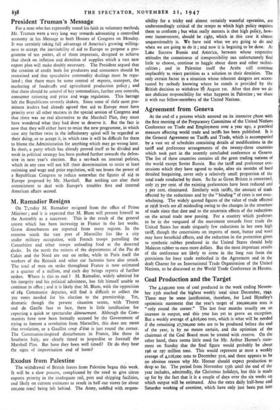President Truman's Message
For a man who has repeatedly stated his faith in voluntary methods Mr. Truman went a very long way towards advocating a controlled economy in his Message to both Houses of Congress on Monday. It was certainly taking full advantage of America's growing willing- ness to accept the inevitability of aid to Europe to propose a pro- gramme of ten points, all of them important, designed to achieve that check on inflation and direction of supplies which a vast new export plan will make doubly necessary. The President argued that the creation of credit both for producers and consumers should be restrained and that speculative commodity dealings must be regu- lated ; that there must be some control of exports, transport, the marketing of foodstuffs and agricultural production policy ; and that there should be control of key commodities, further rent controls, consumer rationing and price and wage regulation. This barrage left the Republicans severely shaken. Since some of their most pro- minent leaders had already agreed that aid to Europe must have priority over all other matters in the special session of Congress and that there was no real alternative to the Marshall Plan, they must have wondered what they had done to deserve it. But the fact is now that they will either have to resist the new programme, in which case any further twist in the inflationary spiral will be regarded as their doing, or to accept it, in which case it will be difficult for them to blame the Administration for anything which may go wrong later. In short, a party which has already proved itself to be divided and weak in political strategy has been pushed further towards the defen- sive in next year's election. But a set-back on internal politics, which in any case will not kill their determination to resist at least rationing and wage and price regulation, will not lessen the power of a Republican Congress to reduce somewhat the figures of aid to Europe proposed by Mr. Marshall. But nothing can alter their commitment to deal with Europe's troubles first and internal American affairs second.


































 Previous page
Previous page